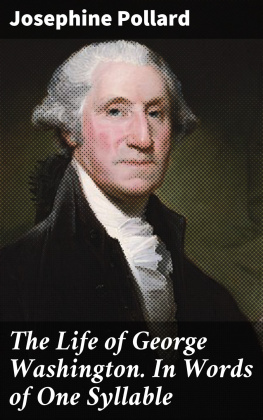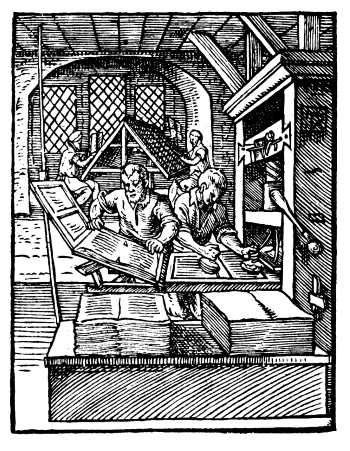Josephine Pollard
The Life of George Washington. In Words of One Syllable
Published by Good Press, 2019
EAN 4057664637291
PREFACE.
The Life story of a public man cannot help being to some extent the same thing as a history of the times in which he lived, and to the case of none does this remark apply with more force than to that of the "Father of his Country;" which very title shows the degree to which the personality of its bearer became identified with the public life of the nation. While a great deal of the space in this book, consequently, has had to be devoted to American Revolutionary History, it is hoped that excess in this direction has been avoided, and that the main purpose of the work will be attained, i.e. to give its young readers a distinct and vivid idea of the exalted character and priceless services of Washington, so far as these can be brought within the understanding of a child.
THE LIFE OF
GEORGE WASHINGTON.
CHAPTER I.
BOY-HOOD.
George Wash-ing-ton was born in the State of Vir-gin-i-a, at a place known as Bridg-es Creek, on Feb-ru-a-ry 22, 1732. His great grand-sire, John Wash-ing-ton, came from Eng-land in the year 1657, and took up lands in that state and was a rich man. George was the son of his grand-son Au-gus-tine. Au-gus-tine's first wife was Jane But-ler who died and left him with two boys. His next wife was Ma-ry Ball, and George was her first child.
The old home-stead in which George was born stood near the banks of the Po-to-mac Riv-er, and was built with a steep roof that sloped down to low eaves that hung out far from the main wall. There were four rooms on the ground floor, and some near the roof, and at each end of the house was a great fire-place built of brick, with broad hearth-stones, such as were in style in those days.
A stone is all that marks the birth-place of George Wash-ing-ton. He was not more than eight years of age when his fa-ther went to live on a farm near the Rap-pa-han-nock Riv-er. The house was built much in the same style as the one at Bridg-es Creek, but it stood on high ground, and here all his boy-hood days were spent.
As there were no good schools in A-mer-i-ca at that time, those who had the means sent their sons to Eng-land to be taught and trained. Law-rence Wash-ing-ton was sent when he was 15 years of age, and as he was the first-born it was thought that he would in time take his fa-ther's place, as head of the house.
The school to which George was sent stood in a field on his fa-ther's land, and was taught by a man named Hob-by. This gave it the name of the "Hob-by School."
There were but three things taught there: How to readHow to writeand How to do sumsand some folks thought that these were all their boys and girls had need to learn. Books were scarce and dear, and as most of the men raised fine crops, and kept up a brisk trade, they were well pleased to have their boys learn how to buy and sell, and to make out bills. George had been trained by his fa-ther, who was a strict and yet a just man, to love the truth and to do right at all times. He was made to feel that it was a sin to tell a lie, and much worse to hide a fault than to own it.
George had a small axe of which he was quite proud, and boy-like, he cut right and left with it, and thought not of the harm he might do. On the lawn stood a small tree which his fa-ther hoped to see grow up to a good height and to bear fine fruit. George made a great gash in this tree with his sharp axe, and when his fa-ther saw it he was quite sad. He called the boy to his side, and in a stern voice said:
"Who did this? Who cut this tree?"
George hung his head with shame. He knew he had done wrong; and he stood in fear of his fa-ther, who he knew would use the rod where there was need of it. It was a chance for the boy to show what kind of stuff he was made of. George raised his face, still red with the blush of shame, and said in his frank way, and with-out a sign of fear:
"I did it, fa-ther, I can-not tell a lie."
There was no need to use the rod on such a boy as that, and the fa-ther must have felt a thrill of joy when he found that the great truths he had taught his son had such a hold on his mind and had struck their roots deep in-to his heart.
It is told that he clasped George to his breast, and said with tears in his eyes; that it would grieve him less to lose scores and scores of trees, than to have his boy tell one lie.
But you must not think that George Wash-ing-ton was such a good-good boy that he could guide him-self, and did not need to be kept in check. He was high strung, as quick as a flash, and felt that he was born to rule, and these traits his mo-ther had to keep down and train so that they would not wreck the young boy, for when George was not yet twelve years of age his fa-ther died, and his mo-ther was left with the care of five young folks. The task was one for which she was well fit, as she had rare good sense, a fine mind, a strong will, and a kind heart.
She used to read to her boys and girls each day out of some good book, talk with them, and tell them how they could best serve God and man, and George laid up each word in his heart, and sought to pay her back as well as he could for all her kind love and care.
She said of George that he was "a good boy;" and it has been said in her praise that "a no-ble mo-ther must have borne so brave a son."
When George was 13 and his half-bro-ther Law-rence 21, Eng-land and Spain went to war, and Law-rence went with the troops that were sent to the West In-dies. The sight of Law-rence in war-like trim, the sound of drum and fife, and the march of troops through the streets, fired the heart of the young lad, and from that time his plays and games, in school and out, took on a war-like turn.
There was a boy at school, named Wil-li-am Bus-tle, who took up arms and marched with as much zeal as George Wash-ing-ton. But George was at all times com-mand-er-in-chief!
He was fond of all the sports that boys love, and could run, and jump, and climb, and toss bars, and took part in all those feats that kept him in health and strength.
He could pitch quoits with great skill, and the place is shown at Fred-er-icks-burg where, when a boy, he flung a stone a-cross the Rap-pa-han-nock. He was fond of a horse, and there was no steed so wild that George could not mount on his back and tame him.
Mrs. Wash-ing-ton had a colt which she thought so much of that she let it run loose in the field. He was so fierce that no one had dared to get on his back.
One day George went out to view the colt with some of his boy friends, and he told them that if they would help him put the bit in the colt's mouth he would mount. The boys drove the colt in-to a small lot, put the bit in his mouth, and Wash-ing-ton was soon on his back. The beast rushed in-to the field, but was soon curbed by the strong arms of the boy on his back. Then the colt reared and plunged and tried in all sorts of ways to get rid of the lad, who clung to the colt's bare back as if he had been glued there. Mad with rage the colt tried once more to throw him, but strained too hard, and fell to the ground and died in a short time.
The group of boys were well scared at this sad end of their fun, and scarce knew what to do. When they went back to the house Mrs. Wash-ing-ton asked the boys if they had seen her fine breed of colts. "The one I am most proud of," said she, "I am told is as large as his sire." Some of the lads hung their heads and knew not what to say; but George spoke up in his frank way and said that the colt was dead.



